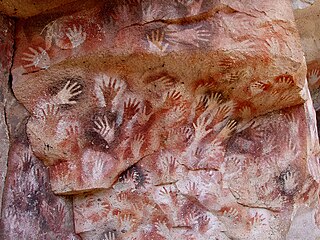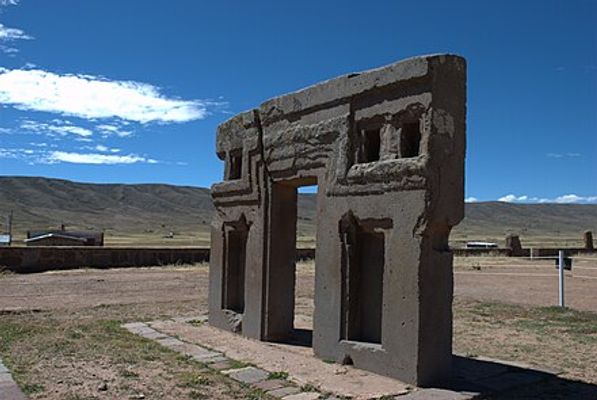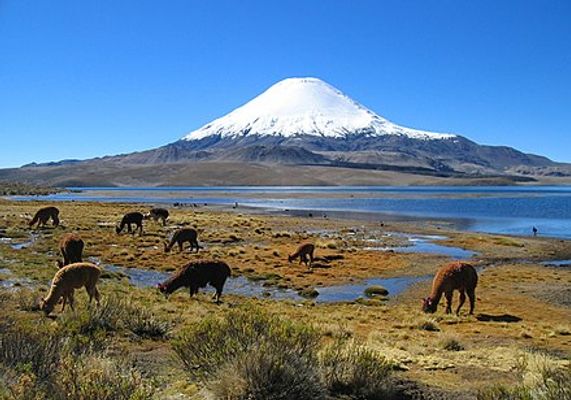
From Wikipedia: Argentina, officially the Argentine Republic (Spanish: República Argentina) is a large country in the southern part of South America, bordering Bolivia, Brazil, and Paraguay to the north, Uruguay to the north-east and Chile to the west. It offers a great diversity of climates and landscapes from jungles in the north, great grass plains in the centre and frozen mountains in the south.
find another country
Who's been?
 #36
#36 #63
#63

Nearby countries
International Airports: EZE BRC CRD COR CNQ FTE EPA EQS FMA MDQ MDZ NQN PSS IGR RES RGL RGA ROS SLA TUC JUJ RLO RHD REL USH

Note to self

Penitente (snow formation)

[from en.wikipedia.org]: Penitentes, or nieves penitentes, are snow formations found at high altitudes. They take the form of elongated, thin blades of hardened snow or ice, closely spaced and pointing towards the general direction of the sun.

Cueva de las Manos

[from en.wikipedia.org]: Cueva de las Manos is a cave and complex of rock art sites in the province of Santa Cruz, Argentina, 163 km (101 mi) south of the town of Perito Moreno. It is named for the hundreds of paintings of hands stenciled, in multiple collages, on the rock walls. The art was created in several waves between 7,300 BC and 700 AD, during the Archaic period of pre-Columbian South America. The age of the paintings was calculated from the remains of bone pipes used for spraying the paint on the wall of the cave to create the artwork, radiocarbon dating of the artwork, and stratigraphic dating.

Iguazu Falls

[from en.wikipedia.org]: Iguazú Falls or Iguaçu Falls are waterfalls of the Iguazu River on the border of the Argentine province of Misiones and the Brazilian state of Paraná. Together, they make up the largest waterfall system in the world. The falls divide the river into the upper and lower Iguazu. The Iguazu River rises near the heart of the city of Curitiba. For most of its course, the river flows through Brazil; however, most of the falls are on the Argentine side. Below its confluence with the San Antonio River, the Iguazu River forms the border between Argentina and Brazil.

The Glorieta of Belgrano, beautiful and mysterious

The Glorieta of Belgrano is an open-air milonga, held in the charming kiosk in the pretty Barrancas Park in Buenos Aires. It was my place to go dancing on a whim when I wanted to. Fifteen minutes of walk and I was there. What a luxury!The Glorieta is a neighborhood milonga. It is while walking through the alleys of the park that we perceive the kiosk and its blue lights, as well as the sweet melody of the tangos which follow one another. Many of us already know this feeling, that of letting our [image from Malvón Tango]

November in Buenos Aires, Jacaranda trees in bloom

Every November is the time of jacaranda trees in bloom, and Buenos Aires gets painted in lavender blue. Jacaranda trees are scattered all around the c [image from www.batravelguide.com]

Mendoza Wine Camp | Exclusive Wine Tours in Argentina

Discover exclusive wine tours in Mendoza! Taste premium wines, visit top wineries, and enjoy immersive experiences with expert guides. Book your adventure today! [image from Mendoza Wine Camp | Mendoza Wine Camp]

Perito Moreno Glacier

[from en.wikipedia.org]: The Perito Moreno, Francisco Gormaz or Bismarck Glacier is a glacier located in Los Glaciares National Park in southwest Santa Cruz Province, Argentina, and originated in the Magallanes Region in Chile, being also part of the Bernardo O'Higgins National Park. It is one of the most important tourist attractions in the Argentine Patagonia.

Buenos Aires
Average temperatures
Jan
30°C20Precipitation: 119 mm
Feb
29°C19Precipitation: 118 mm
Mar
26°C17Precipitation: 134 mm
Apr
23°C13Precipitation: 97 mm
May
19°C10Precipitation: 74 mm
Jun
16°C8Precipitation: 63 mm
Jul
15°C8Precipitation: 66 mm
Aug
17°C8Precipitation: 70 mm
Sep
19°C10Precipitation: 73 mm
Oct
22°C13Precipitation: 119 mm
Nov
25°C15Precipitation: 109 mm
Dec
28°C18Precipitation: 105 mm

Córdoba
Average temperatures
Jan
31°C18Precipitation: 122 mm
Feb
30°C17Precipitation: 100 mm
Mar
28°C16Precipitation: 110 mm
Apr
25°C12Precipitation: 52 mm
May
22°C9Precipitation: 19 mm
Jun
19°C6Precipitation: 11 mm
Jul
19°C6Precipitation: 13 mm
Aug
21°C7Precipitation: 9.7 mm
Sep
23°C9Precipitation: 34 mm
Oct
26°C13Precipitation: 66 mm
Nov
28°C15Precipitation: 97 mm
Dec
30°C17Precipitation: 137 mm

Rosario
Average temperatures
Jan
31°C18Precipitation: 105 mm
Feb
30°C17Precipitation: 116 mm
Mar
27°C15Precipitation: 165 mm
Apr
23°C12Precipitation: 80 mm
May
20°C8Precipitation: 47 mm
Jun
17°C5Precipitation: 37 mm
Jul
16°C5Precipitation: 37 mm
Aug
18°C6Precipitation: 37 mm
Sep
21°C8Precipitation: 62 mm
Oct
24°C11Precipitation: 92 mm
Nov
27°C14Precipitation: 98 mm
Dec
30°C16Precipitation: 120 mm

Mendoza
Average temperatures
Jan
32°C18Precipitation: 36 mm
Feb
31°C17Precipitation: 34 mm
Mar
27°C14Precipitation: 27 mm
Apr
24°C10Precipitation: 13 mm
May
19°C6Precipitation: 5.9 mm
Jun
16°C2Precipitation: 4.1 mm
Jul
15°C2Precipitation: 6.7 mm
Aug
19°C4Precipitation: 3.3 mm
Sep
21°C6Precipitation: 7.8 mm
Oct
26°C11Precipitation: 11 mm
Nov
29°C14Precipitation: 16 mm
Dec
32°C17Precipitation: 24 mm

La Plata
Average temperatures
Jan
29°C17Precipitation: 97 mm
Feb
28°C17Precipitation: 103 mm
Mar
25°C15Precipitation: 118 mm
Apr
22°C11Precipitation: 74 mm
May
18°C8Precipitation: 74 mm
Jun
15°C6Precipitation: 55 mm
Jul
14°C6Precipitation: 58 mm
Aug
16°C6Precipitation: 66 mm
Sep
18°C8Precipitation: 74 mm
Oct
21°C10Precipitation: 111 mm
Nov
24°C13Precipitation: 93 mm
Dec
27°C16Precipitation: 85 mm

Salta
Average temperatures
Jan
27°C16Precipitation: 182 mm
Feb
26°C16Precipitation: 163 mm
Mar
25°C15Precipitation: 118 mm
Apr
23°C12Precipitation: 37 mm
May
21°C8Precipitation: 8.6 mm
Jun
19°C4Precipitation: 2.6 mm
Jul
20°C3Precipitation: 3.5 mm
Aug
22°C5Precipitation: 4.2 mm
Sep
24°C7Precipitation: 6.6 mm
Oct
26°C11Precipitation: 26 mm
Nov
27°C14Precipitation: 65 mm
Dec
28°C16Precipitation: 138 mm

San Carlos de Bariloche
Average temperatures
Jan
22°C6Precipitation: 22 mm
Feb
22°C6Precipitation: 22 mm
Mar
19°C4Precipitation: 29 mm
Apr
15°C2Precipitation: 54 mm
May
10°C1Precipitation: 134 mm
Jun
7°CPrecipitation: 141 mm
Jul
6°CPrecipitation: 129 mm
Aug
8°CPrecipitation: 116 mm
Sep
11°CPrecipitation: 58 mm
Oct
14°C1Precipitation: 39 mm
Nov
17°C4Precipitation: 25 mm
Dec
20°C5Precipitation: 32 mm

El Calafate
Average temperatures
Jan
19°C8Precipitation: 13 mm
Feb
19°C8Precipitation: 7.8 mm
Mar
16°C6Precipitation: 14 mm
Apr
13°C3Precipitation: 25 mm
May
8°C0Precipitation: 31 mm
Jun
5°CPrecipitation: 21 mm
Jul
4°CPrecipitation: 26 mm
Aug
7°CPrecipitation: 21 mm
Sep
10°C1Precipitation: 16 mm
Oct
14°C3Precipitation: 12 mm
Nov
16°C5Precipitation: 9.1 mm
Dec
18°C7Precipitation: 14 mm

Nahuel Huapi National Park
No climate information available.








_JPG_440px-General_view_-_Trinidad_(Paraguay).JPG)
_jpg_2560px-Uruguay_(5886752274).jpg)